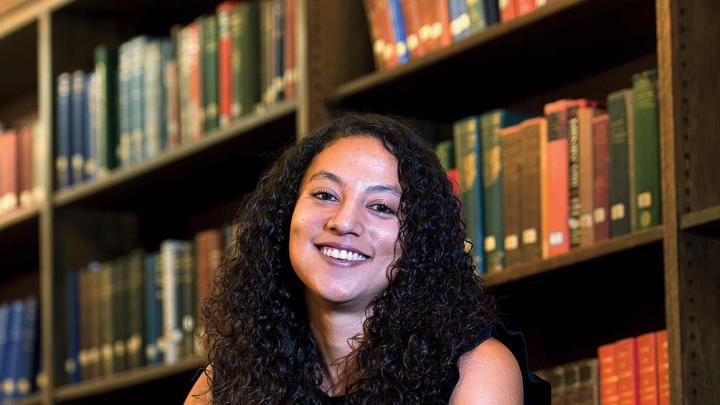Elizabeth Hinton’s fascination with the past started early. “As a little girl, I used to ask my parents to tell me about what I called then ‘the olden times.’” One central piece of family history concerned their decision to leave Georgia in the early 1940s. One night, a white man sat down far to the rear of an otherwise empty bus, and when Hinton’s grandfather refused to change his own seat, the bus driver pulled out a gun. Eventually, her grandfather found a job in Michigan, where Hinton grew up. “I like to say I was born in Ann Arbor, came of age in New York”—she studied at NYU and Columbia—“and now I’m coming into myself in Boston.” In 2014, she joined Harvard’s history and African and African American studies departments as an assistant professor. Behind her desk, posters of McGruff the Crime Dog glare at visitors—a fixture of public-service announcements, billboards, and TV commercials in the 1980s, when he exhorted citizens to “Take a bite out of crime.” Hinton’s recent book, From the War on Poverty to the War on Crime, draws on government archives and a flurry of Freedom of Information Act requests to trace mass incarceration in the United States back to the Johnson administration. “Some of the first feedback I got on what would become the book,” she says, “was from men who had experienced the criminal justice system first-hand,” whom she’d met while visiting loved ones in correctional facilities in California. In a small city in the central part of that state, she’s now working with local law enforcement on new approaches to procedural justice. “The Chief kind of considers me the Stockton police historian,” says Hinton. “The ways in which history is centered in ideas about moving forward, really, really gives me hope about what’s possible.”
Harvard Portrait: Elizabeth Hinton

Elizabeth Hinton
Photograph by Jim Harrison
You might also like
Breaking Bread
Alexander Heffner ’12 plumbs the state of democracy.
Reading the Winds
Thai sailor Sophia Montgomery competes in the Olympics.
Chinese Trade Dragons
How Will China’s Rapid Growth in the Clean Technology Industry Reshape U.S.-China Policy?
Most popular
More to explore
Harvard Philosophy Professor Alison Simmons on "Being a Minded Thing"
A philosopher on perception, the canon, and being “a minded thing”







